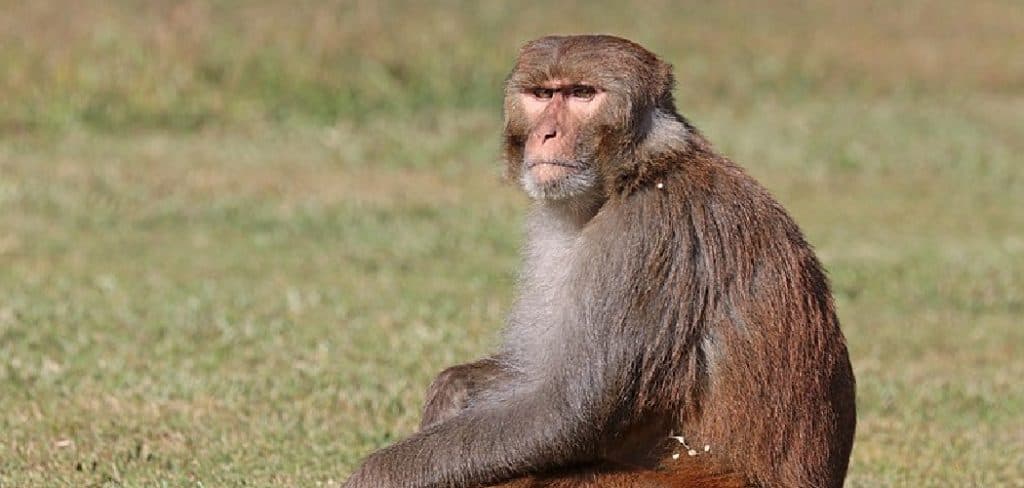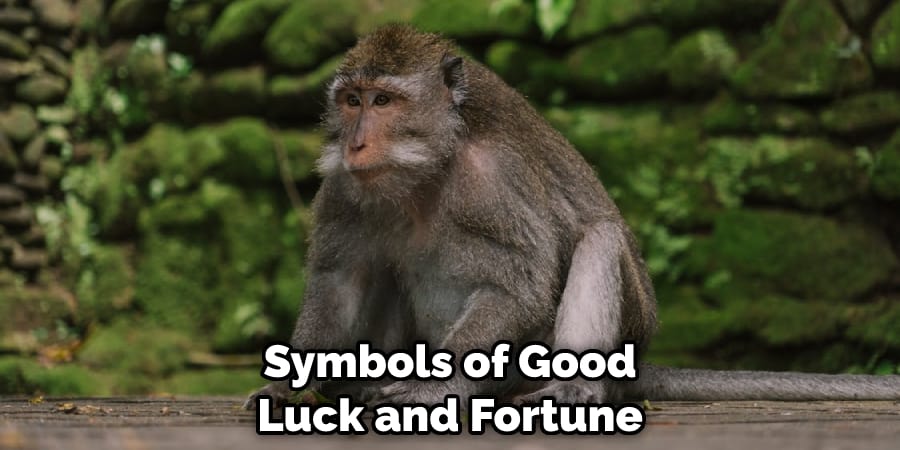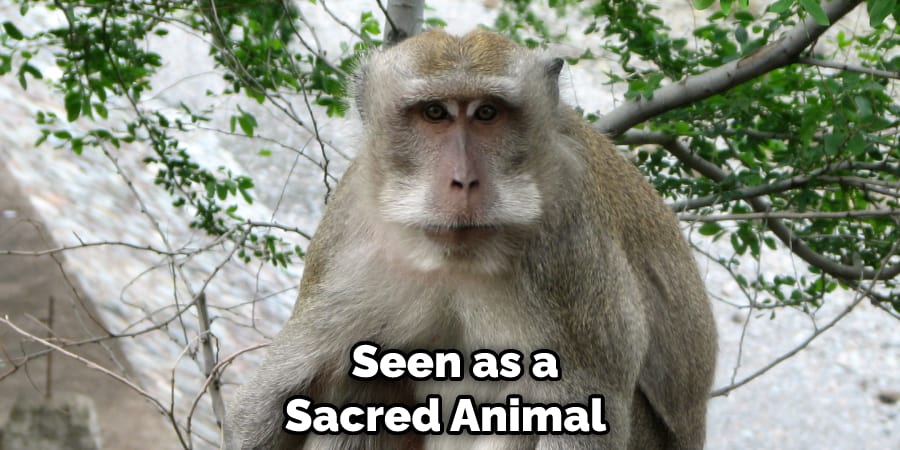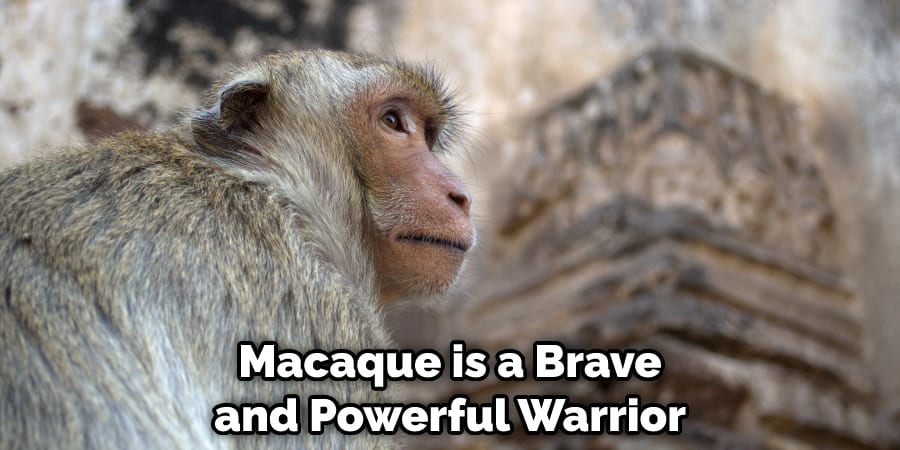According to macaque spiritual meaning, these animals are thought to be harbingers of good luck. In some parts of Asia, it is believed that a macaque sighting is a sign that good fortune is on the way. Some people even believe that rubbing the body of a macaque can bring good luck. Whether you believe in their spiritual significance or not, there’s no denying that macaques are fascinating creatures!

Macaque Symbolism and Meaning
Macaque Native American Symbolism
In many Native American cultures, the macaque is seen as a symbol of strength, wisdom, and good fortune. The macaque is a small, intelligent creature that is known for its mischievous nature. Native Americans believe that the macaque can see into the future, and as a result, it is often seen as a guide or protector.
In some tribes, the macaque is also associated with healing and cleansing rituals. In many ways, the macaque embodies the best of what Native Americans value: strength, intelligence, playfulness, and a connection to the natural world. As a result, the macaque is an important part of Native American culture and symbolism.
Macaque Eastern Symbolism
In many cultures, the macaque is seen as a symbol of good luck and fortune. In China, for example, the creatures are often portrayed in art as happy and contented beings surrounded by an abundance of fruit and other symbols of prosperity. In Japan, the macaque is considered a bringer of good luck, particularly if it is shown holding a Japanese maple leaf.
In India, the macaque is also seen as a lucky symbol and is often featured on wedding cards and other celebratory materials. As such, it is clear that the macaque holds much symbolic significance in many parts of the world.

Macaque Celtic Symbolism
Celtic monkeys have long been considered to be symbols of good luck and fortune. In ancient times, Celts believed that the world was inhabited by two types of creatures: human beings and animals. Animals were seen as closer to the gods and more in tune with the natural world, while humans were more prone to greed and violence. As a result, animals were often used as totems and mascots, designed to protect and guide people through life.
The macaque, with its cheeky grin and mischievous nature, was particularly popular amongst the Celts. It represented qualities such as wit, intelligence, and resourcefulness. In recent years, the macaque has enjoyed a resurgence in popularity, appearing on everything from necklaces to coffee mugs. However, the macaque is still seen as a symbol of good luck and fortune for many people.
Macaque African Symbolism
In Africa, the macaque is a widely recognized symbol of good fortune. These graceful monkeys are often considered to be a sign of luck and are often depicted in various forms of art and literature. In many cultures, the macaque is also seen as a protector of children. This is likely due to their close association with motherhood. Macaques are known to be very nurturing mothers, and they often form strong bonds with their young.
For this reason, the macaque is often seen as a symbol of fertility and motherhood. In some cultures, the macaque is also considered to be a symbol of strength and resilience. This is likely due to their ability to adapt to different environments and challenges. Despite their challenges, macaques always seem to find a way to overcome them. For this reason, they are often seen as an inspiration to humans facing difficulties in their lives.
Macaque Spiritual Meaning
The macaque is a species of Old World monkey that is found across Asia and Africa. In many cultures, the macaque is seen as a sacred animal and plays an important role in mythology and folklore. The Chinese zodiac also features the macaque as one of its twelve animals. In Chinese culture, the macaque is seen as a symbol of good luck and prosperity. The animal is also associated with wisdom and cleverness.

In Hinduism, the macaque is considered to be an incarnation of the god Hanuman. Hanuman is often depicted as having the head of a macaque, and the two animals share many qualities, including loyalty and strength. In Nepal, a legend states that the first man was born from a macaque womb. This makes the macaque a powerful symbol of fertility and new life. The macaque is an intriguing and fascinating animal regardless of its cultural significance.
Macaque in Dreams
Dreams have been a source of fascination for people throughout history. They have been interpreted as messages from the gods, prophetic visions of the future, and even Warning signs from our subconscious mind. Whatever their meaning, dreams are a universal human experience. And, as it turns out, we’re not the only ones who dream. Macaques, a type of monkey, also experience REM sleep and appear to dream.
This was first discovered in the 1940s by researchers who were studying sleep patterns in animals. Since then, several studies have been conducted on macaques that suggest they dream about similar things to humans, such as flying and chasing predators. So next time you have a strange dream, know that you’re in good company!
Whether they’re interpreted as warnings or wish fulfillment, dreams are an important part of what makes us human. And it seems we’re not the only ones who enjoy a good dream every now and then.
Macaque Encounters and Omens
In many cultures, encountering a macaque is considered to be a very bad omen. It is believed that these animals are imbued with negative energy and that they can bring misfortune to those who cross their path. In some cases, it is even thought that macaques can steal people’s souls. For these reasons, it is best to avoid crossing paths with a macaque if at all possible.
However, if you do find yourself near one of these animals, there are some things you can do to ward off bad luck. For instance, you can make a loud noise or throw something at the macaque to frighten it away. You can also try carrying a lucky charm or wearing protective clothing. Hopefully, by taking these precautions, you’ll be able to avoid any negative consequences of encountering a macaque.
Macaque’s Meaning in Mythology and Folklore
The Macaque is a curious creature that has been the subject of many myths and folklore over the years. In some cultures, the Macaque is seen as a trickster, while in others, it is seen as a bringer of good luck. However, the Macaque is a fascinating creature that has inspired many stories regardless of their views.
One of the most popular tales involving the Macaque is that of the Monkey King. Macaque is a brave and powerful warrior in this story who protects his kingdom from evil forces. The Monkey King is also known for his cunning and ability to outwit his enemies. This story is popular in many cultures, and it shows the Macaque in a positive light.

Many folktales also feature the Macaque as a trickster character. In these stories, the Macaque uses its intelligence and wit to take advantage of others. While these stories may not be as popular as the Monkey King tale, they still show the Macaque in a positive light. After all, who doesn’t enjoy a good trickster story?
No matter how they are viewed, it is clear that the Macaque has had a significant impact on mythology and folklore over the years. This curious creature has inspired many stories and continues to fascinate people from all over the world.
Macaque Totem Animal
The macaque is a popular totem animal in Asia, where it is often seen as a protector of crops and a bringer of good luck. The macaque is a member of the monkey family, and it is found in forests across much of Southeast Asia. However, unlike other monkeys, the macaque has a short tail and typically lives on the ground rather than in trees.
Macaques are known for their intelligence and playful nature and are often kept as pets. In Chinese culture, the macaque is associated with the god of wealth, and it is believed that if you spot a macaque during the New Year, you will be blessed with good fortune. So whether you see them in the wild or captivity, macaques are sure to bring a smile.
Macaque Tattoo Meaning
Macaques are a type of monkey that is found in Asia and Africa. They are known for their intelligence and their playful nature. In many cultures, the macaque is seen as a symbol of good luck and fortune. Consequently, macaque tattoos are often seen as lucky charms.
The most popular meaning of macaque tattoos is good luck. Macaques are seen as symbols of strength, courage, and fertility. They are also associated with the sun, which is considered to be a source of life and energy. As a result, macaque tattoos are often seen as good luck charms that can help to bring success and happiness.
Macaques are also sometimes associated with strength and power. In many cultures, the macaque is seen as a powerful animal that is capable of great strength and endurance. As a result, macaque tattoos can also be seen as a way to show off one’s strength and power.

Finally, macaques are also associated with fertility. In many cultures, the macaque is seen as a symbol of abundance and fertility. As a result, macaque tattoos can also be seen as good luck charms that can help to bring children into one’s life.
Conclusion
The macaque is a powerful totem animal that can teach us about strength, adaptability, and resilience in the face of adversity. By understanding the symbolism and meaning of this animal, we can learn to apply these qualities to our lives. Thanks for reading our post about the macaque spiritual meaning.
You Can Check It Out To Stag Beetle Spiritual Meaning, Symbolism and Totem
